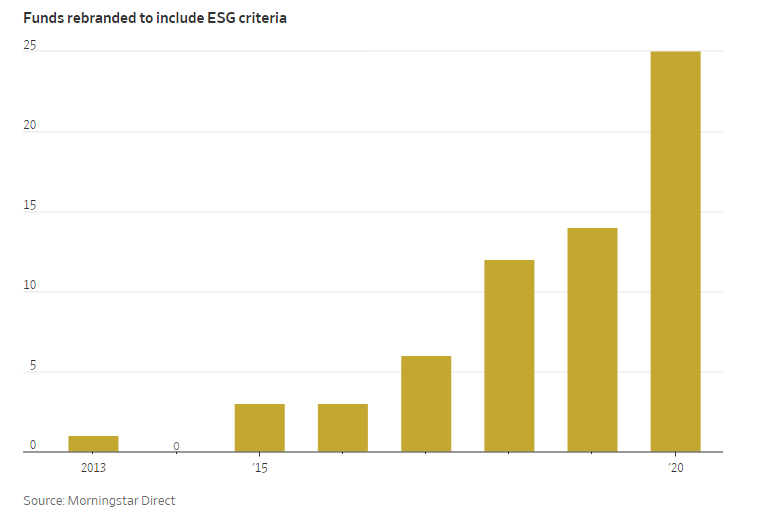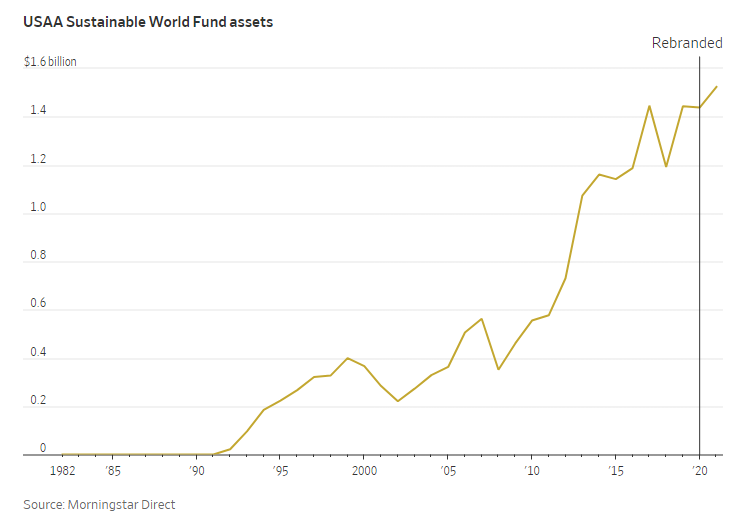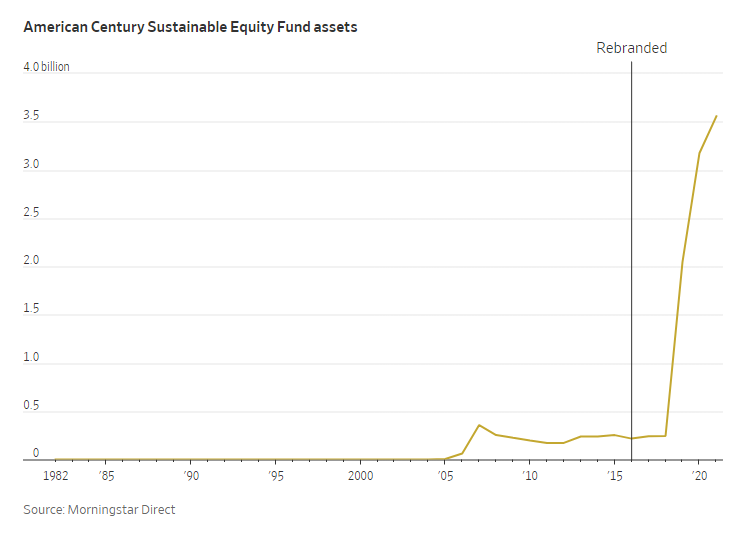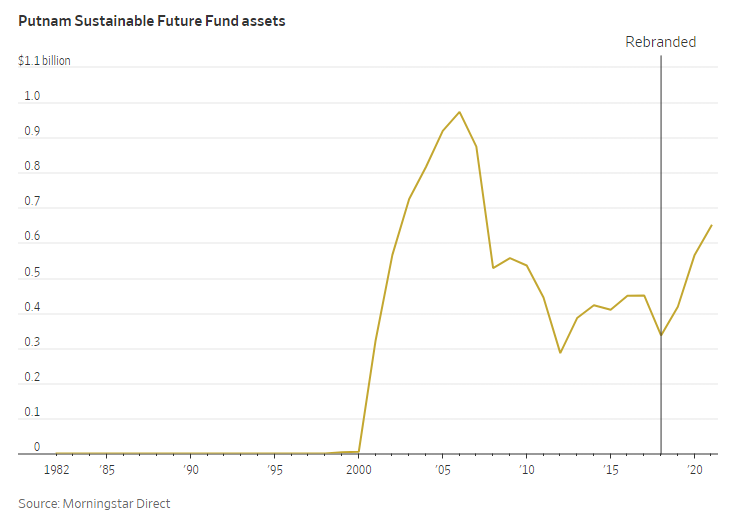Companies are turning their struggling funds green to capture the flood of cash into sustainable investments.
Fund companies are rebranding their out-of-fashion investment offerings as green, hoping to grab a portion of the cash pouring into sustainable products. In some cases, the rebranding has been in name only.
Last year, companies that manage mutual funds and exchange-traded funds rebranded a record 25 funds as sustainable, according to Morningstar. They say these funds have adopted investment strategies that utilize data on companies’ environmental, social and governance performance to pick stocks. Since 2013, fund companies have rebranded 64 funds, which had $35 billion in assets as of June.
The American Century Fundamental Equity Fund is now theSustainable Equity Fund, the USAA World Growth Fund is theUSAA Sustainable World Fundand the Putnam Multi-Cap Growth Fund is now thePutnam Sustainable Leaders Fund. Assets for all three are up since the rebrandings.
Many of these funds are actively managed and were experiencing chronic outflows prior to rebranding, said Morningstar Head of Sustainability Research Jon Hale. “You have big fund companies with an inventory of funds, a lot of which aren’t really attracting assets anymore, saying ‘OK, here’s this new investment trend happening; what do we do?’” Mr. Hale said.

Of the 64 rebranded funds, 35 were suffering from investor withdrawals in the three years before they went green, according to a Wall Street Journal analysis of Morningstar data. At 13 of the funds, investors began putting in cash again. At 45, new cash plus the rising stock market have boosted overall assets.

A disclosure was added to the fund’s prospectus noting ESG ratings are considered but fund managers may disagree with a raters’ conclusion. The Sustainable World Fund continued to hold shares of companies such as mining firmRio TintoPLC and purchased shares in oil-and-gas companies after rebranding.
“We believe incorporating ESG considerations into a portfolio should be an input under a larger mosaic of considerations any manager evaluates to achieve a well-balanced, diversified portfolio,” said Mannik S. Dhillon, president of VictoryShares & Solutions, an investment adviser for USAA.

“To us, that was an affirmation that we made the right changes,” said American Century Vice President Joe Reiland. “The performance was getting better, the investment community was more interested in investing sustainably and it made us more marketable to clients.”
The fund beat the S&P 500 over the past five years and boasts its portfolio companies emit 67% fewer greenhouse gases than the index, according to the fund’s sustainability report. The fund dumped shares of 12 firms during the transition includingExxon MobilCorp.while adding electric-vehicle makerTeslaInc.
It keptConocoPhillips,even though it is a big greenhouse-gas emitter, because it was shifting more toward sustainability, Mr. Reiland said. “After analyzing the two, ConocoPhillips was demonstrating the ability to become an ESG leader over Exxon,” Mr. Reiland said.
Other companies frequently dumped by rebranded funds were oil-and-gas producerDevon EnergyCorp., tobacco firmPhilip Morris InternationalInc.and aerospace companiesGeneral DynamicsCorp.andBoeingCo., according to a Journal analysis of constituents of 43 funds with historical data.
Rebranded funds typically bought tech companies such as chip makerTexas InstrumentsInc.and software makerCadence Design SystemsInc.One reason sustainable funds have done well is because technology companies have trounced energy stocks in the past few years. Nearly 70% of 286 sustainable funds ranked in the top half of their performance category last year, according to Morningstar.

Assets of the rechristened Putnam Sustainable Leaders Fund rose by 66% to $6.5 billion as of this June. ThePutnam Sustainable Future Fundgrew its assets by 93% to $649 million, according to the Journal’s analysis. Both funds have outperformed their benchmarks and the S&P 500 in the past three years after periods of mixed performance prior to rebranding.
The Sustainable Future Fund underwent the most dramatic change, shifting 75% of its portfolio to focus on sustainable firms, according to Putnam’s head of sustainable investing, Katherine Collins. “There are a wide range of approaches that folks are taking in developing sustainable funds, and for Putnam it was pretty far into the heavy-lift side of things.”
Stocks in energy firms like ConocoPhillips were dropped, and renewable-resource firms were added such as solar-panel makerSunrunInc.,which was a top contributor to the fund’s 2020 performance.
“We’re happy not just with the numbers but with how those numbers have been generated,” Ms. Collins said.
Comments